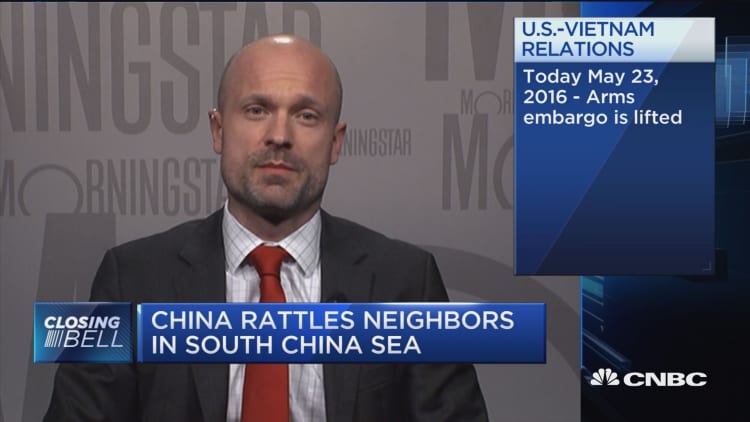
On Monday the U.S. announced it would officially end its weapons embargo on Vietnam, but the long-awaited move might have little effect on the global arms market.
In fact, Vietnam only accounts for about 3 percent of international arms sales, and the country gets the vast majority of its weaponry from Russia, so Monday's news is unlikely to represent a market shift, according to Christopher Higgins, a defense analyst at Morningstar.
Still, if there are some potential winners from the deal, they would come from Vietnam's desire to maintain security over its portions of the South China Sea. Boeing — for its production of maritime surveillance aircraft — and drone-makers like Northrop Grumman could end up profiting somewhat from the new arrangement, Higgins told CNBC's "Closing Bell."
But while there is no immediate "huge upside" to American defense providers, Higgins emphasized the geopolitical importance of Monday's announcement.
"If you look at Vietnam, they are key in the South China Sea for our security strategy in that area," he said, adding that the country is also "really key in terms of other agreements" like the proposed Trans-Pacific Partnership multilateral trade deal.
The embargo lifting came during President Barack Obama's first visit to Hanoi, which his hosts described as the arrival of a warm spring and a new chapter in relations between two countries that were at war four decades ago.
President Obama, the third U.S. president to visit Vietnam since diplomatic relations were restored in 1995, has made a strategic "rebalance" toward Asia a centerpiece of his foreign policy.
The decision to lift the arms trade ban suggested such concerns outweighed arguments that Vietnam had not done enough to improve its human rights record and Washington would lose leverage for reforms.
The U.S. announced in 2014 that it would partially lift the ban on "lethal aid" to Vietnam.
Part of the reason countries like Vietnam are looking to the U.S. over traditional supplier Russia is that Moscow has been unwilling to sell some arms that China has asked it to exclude, Steve Zaloga, a senior analyst with aerospace and defense consulting firm Teal Group, told CNBC at the time.
"The Russians have tended to be rather dependent on China as an export client," Zaloga said in 2014, "So Russia is sort of in a bind when trying to sell to the Vietnamese."
— Reuters contributed to this report.




